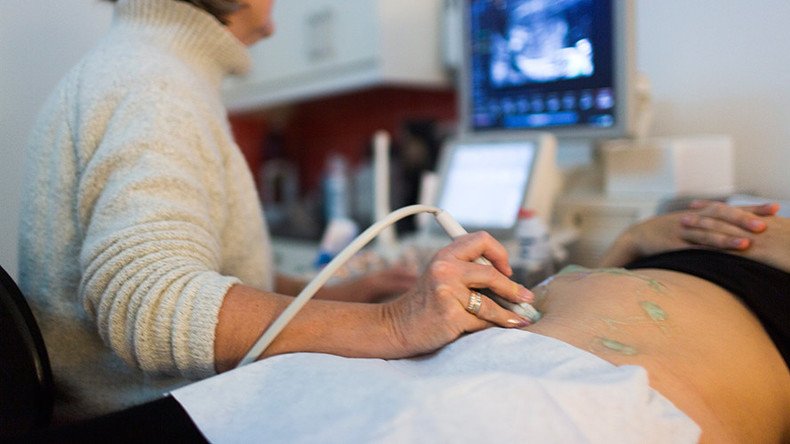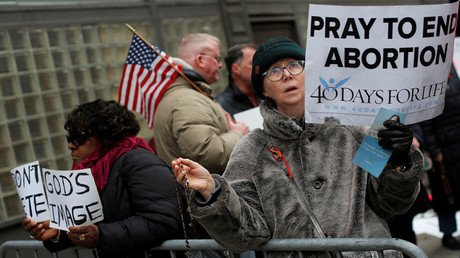Indiana’s abortion ultrasound mandate blocked by federal judge

A federal judge has blocked an Indiana state law requiring women to undergo an ultrasound at least 18 hours before having an abortion, finding that it creates "clearly undue" burdens on women and is unconstitutional.
In July, then-Governor Mike Pence, who is now US vice president, enacted the mandate when he signed House Enrolled Act No. 1337. Days later, the American Civil Liberties Union (ACLU) filed a lawsuit on behalf of Planned Parenthood of Indiana and Kentucky (PPINK) against Indiana's Department of Health and other local officials.
On Friday, US District Judge Tanya Walton Pratt ruled with Planned Parenthood, granting a preliminary injunction that temporarily blocks the mandate.
In the 53-page ruling, Pratt found that the 18-hour waiting period “creates an undue burden on a woman’s right to choose to have an abortion and is therefore unconstitutional.”
"For women faced with the already high costs of an abortion and a lack of means to afford them, the additional expenses of lengthy travel, lost wages, and child care created by the new ultrasound law create a significant burden," Pratt wrote in the ruling.
The state said the mandate was meant to convince women not to have an abortion by having them view an ultrasound the day before their abortion, rather than the day of the abortion.
The state cites a 2014 study of 15,000 women who sought abortions from a Planned Parenthood center in Los Angeles, California. The study found 99 percent of women who saw an ultrasound went through with an abortion when they do not view an ultrasound, compared to 98.4 percent who did view the ultrasound.
The state concluded that “voluntary viewing was associated with some women’s decision to continue the pregnancy.”
However, Pratt argued that the ultrasound had a “very small impact on a small percentage of abortion patients.”
“Simply put, the State has not provided any convincing evidence that requiring an ultrasound to occur eighteen hours prior to an abortion rather than on the day of an abortion makes it any more likely that a woman will choose not to have an abortion,” Pratt wrote in the ruling, adding that the burden imposed on women “dramatically outweigh the benefits” of the mandate.
The ruling states that prior to the new ultrasound laws, women in the state were still required to undergo an ultrasound before an abortion, however, they were allowed to have it done the same day before the abortion and were not required to view the ultrasound.
In 2016, only about 25 percent of Indiana women seeking abortions at a PPINK health center actually viewed the ultrasound.
“It is difficult to conclude then that the new ultrasound law promotes fetal life in any significant way when three-fourths of women in Indiana do not even view the ultrasound image,” Pratt said in the ruling.
So far, the ruling says that nine women have not been able to obtain an abortion due to the new ultrasound law.
"I would prefer that the Legislature figure out that it's not their job to practice medicine, and that we would in fact get politicians out of our doctors' offices," said Betty Cockrum, the CEO and president of Planned Parenthood of Indiana and Kentucky, according to the Associated Press.
"As much as I like working with the ACLU, I'd rather that the legislature figure out it's not their job to practice medicine."-Betty Cockrum
— PPINK (@PPIndKentucky) April 3, 2017
On Monday, Mike Fichter, President and CEO of the anti-abortion group Indiana Right to Life, released a statement, arguing that Planned Parenthood filed the lawsuit because they were simply “worried about money.”
“Planned Parenthood doesn’t want to spend money on purchasing ultrasound equipment for any of its non-abortion locations. It also doesn’t want to risk losing abortion profits if women change their mind about ending their pregnancies,” Fichter said.
Planned Parenthood doesn’t want to spend money on buying ultrasound equipment for any of its non-abortion sites https://t.co/Hv4yUc9Ru6
— IN Right to Life (@irtl) April 3, 2017
Fichter urged Indiana Attorney General Curtis Hill to appeal the case in a higher court. The state has 30 days to file an appeal.
'Fetal tissue' #PlannedParenthood video makers charged https://t.co/oN6JoDp9bhpic.twitter.com/RgQdrDWOZD
— RT America (@RT_America) March 29, 2017













